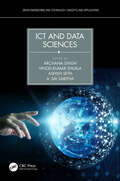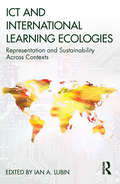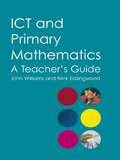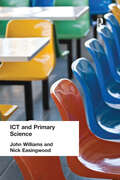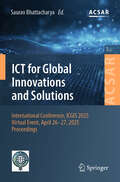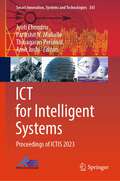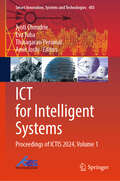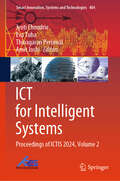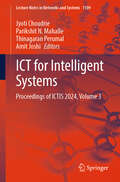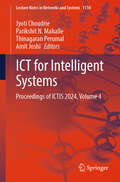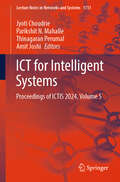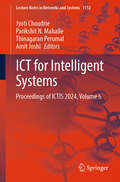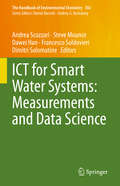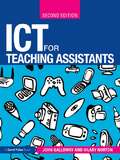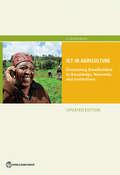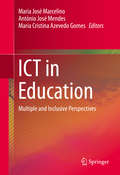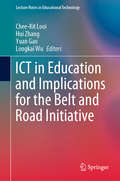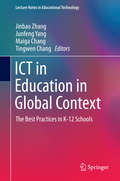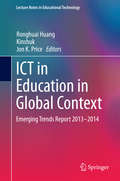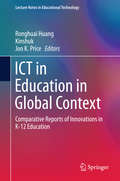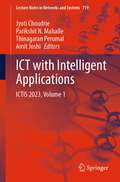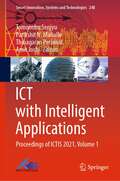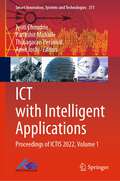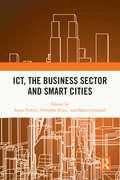- Table View
- List View
ICT and Data Sciences (Green Engineering and Technology)
by Archana Singh Ashish Seth Vinod Kumar Shukla A. Sai SabithaThis book highlights the state-of-the-art research on data usage, security, and privacy in the scenarios of the Internet of Things (IoT), along with related applications using Machine Learning and Big Data technologies to design and make efficient Internet-compatible IoT systems. ICT and Data Sciences brings together IoT and Machine Learning and provides the careful integration of both, along with many examples and case studies. It illustrates the merging of two technologies while presenting basic to high-level concepts covering different fields and domains such as the Hospitality and Tourism industry, Smart Clothing, Cyber Crime, Programming, Communications, Business Intelligence, all in the context of the Internet of Things. The book is written for researchers and practitioners, working in Information Communication Technology and Computer Science.
ICT and International Learning Ecologies: Representation and Sustainability Across Contexts
by Ian A. LubinICT and International Learning Ecologies addresses new ways to explore international, comparative, and cultural issues in education and technology. As today’s development orthodoxies push societies around the world to adopt imported information communication tools, new approaches are needed that integrate cultural responsiveness, autonomy, and sustainability into technology-enhanced learning. This edited collection conceptually and methodologically reframes the complexities of teaching and learning in historically marginalized communities around the world, where inequities are often exacerbated by one-size-fits-all programs. Graduate students and researchers of educational technology, international/comparative education, and sustainability education will be better prepared to lead information and communication technologies (ICT) implementation across a range of contexts and learner identities.
ICT and Primary Mathematics: A Teacher's Guide
by John Williams Nick EasingwoodThis book is for teachers who are looking for interesting and practical ways to incorporate ICT into their daily lesson plans. It shows how ICT can be used as a tool for mathematics, but more importantly how its proper use can enhance the mathematics being taught. The authors cover all current aspects of ICT and mathematics, including: databases spreadsheets logo and the use of floor turtles and control technology handling of resources including interactive whiteboards management of ICT within the classroom how ICT can be used to present mathematical topics and links to other areas of the curriculum. With plenty of suggestions on how to use the software and hardware described in the book, this is a useful resource for all primary teachers, particularly subject co-ordinators for ICT and mathematics. It will also be of interest to students on PGCE and Initial Teacher Training courses.
ICT and Primary Science
by John Williams Nick EasingwoodThroughout this book, the authors emphasize that primary science is at its best as a practical, hands-on experience for children. When ICT is used in an integral way, it can enable practical work to be done at a more sophisticated level, helping children to make sense of their findings. The book includes several case studies from primary classrooms and each chapter includes practical suggestions for teachers. The wide-ranging topics covered include: databases and spreadsheets data logging control technology ICT, drama and science school visits planning for ICT and science choosing and using software. ICT and Primary Science is an accessible and jargon-free resource for teachers and student teachers of primary science.
ICT for Global Innovations and Solutions: International Conference, ICGIS 2025, Virtual Event, April 26-27, 2025, Proceedings (Advances in Computer Science Applications and Research #1)
by Saurav BhattacharyaThis ACSAR volume constitutes the refered proceedings of International Conference, ICGIS 2025, Virtual Event, held during April 26-27, 2025. ICGIS 2025 emphasize innovation in interdisciplinary research and applications, showcasing transformative ideas across diverse domains. The volume constitutes 49 full papers out of numerous submissions. The event featured compelling conversations across a range of domains—Artificial Intelligence, Smart Infrastructure, Climate Adaptation, Renewable Energy, Cybersecurity, Digital Health, and Data-Driven Policy—united by a common vision: innovating toward a more sustainable and secure future.
ICT for Intelligent Systems: Proceedings of ICTIS 2023 (Smart Innovation, Systems and Technologies #361)
by Amit Joshi Jyoti Choudrie Parikshit N. Mahalle Thinagaran PerumalThis book gathers papers addressing state-of-the-art research in all areas of information and communication technologies and their applications in intelligent computing, cloud storage, data mining and software analysis. It presents the outcomes of the Seventh International Conference on Information and Communication Technology for Intelligent Systems (ICTIS 2023), held in Ahmedabad, India. It discusses the fundamentals of various data analysis techniques and algorithms, making it a valuable resource for researchers and practitioners alike.
ICT for Intelligent Systems: Proceedings of ICTIS 2024, Volume 1 (Smart Innovation, Systems and Technologies #403)
by Amit Joshi Jyoti Choudrie Thinagaran Perumal Eva TubaThis book gathers papers addressing state-of-the-art research in all areas of information and communication technologies and their applications in intelligent computing, cloud storage, data mining, and software analysis. It presents the outcomes of the 8th International Conference on Information and Communication Technology for Intelligent Systems (ICTIS 2024), held in Las Vegas, USA. The book is divided into six volumes. It discusses the fundamentals of various data analysis techniques and algorithms, making it a valuable resource for researchers and practitioners alike.
ICT for Intelligent Systems: Proceedings of ICTIS 2024, Volume 2 (Smart Innovation, Systems and Technologies #404)
by Amit Joshi Jyoti Choudrie Thinagaran Perumal Eva TubaThis book gathers papers addressing state-of-the-art research in all areas of information and communication technologies and their applications in intelligent computing, cloud storage, data mining, and software analysis. It presents the outcomes of the 8th International Conference on Information and Communication Technology for Intelligent Systems (ICTIS 2024), held in Las Vegas, USA. The book is divided into six volumes. It discusses the fundamentals of various data analysis techniques and algorithms, making it a valuable resource for researchers and practitioners alike.
ICT for Intelligent Systems: Proceedings of ICTIS 2024, Volume 3 (Lecture Notes in Networks and Systems #1109)
by Amit Joshi Jyoti Choudrie Parikshit N. Mahalle Thinagaran PerumalThis book gathers papers addressing state-of-the-art research in all areas of information and communication technologies and their applications in intelligent computing, cloud storage, data mining, and software analysis. It presents the outcomes of the 8th International Conference on Information and Communication Technology for Intelligent Systems (ICTIS 2024), held in Ahmedabad, India. The book is divided into six volumes. It discusses the fundamentals of various data analysis techniques and algorithms, making it a valuable resource for researchers and practitioners alike.
ICT for Intelligent Systems: Proceedings of ICTIS 2024, Volume 4 (Lecture Notes in Networks and Systems #1110)
by Amit Joshi Jyoti Choudrie Parikshit N. Mahalle Thinagaran PerumalThis book gathers papers addressing state-of-the-art research in all areas of information and communication technologies and their applications in intelligent computing, cloud storage, data mining, and software analysis. It presents the outcomes of the 8th International Conference on Information and Communication Technology for Intelligent Systems (ICTIS 2024), held in Ahmedabad, India. The book is divided into six volumes. It discusses the fundamentals of various data analysis techniques and algorithms, making it a valuable resource for researchers and practitioners alike.
ICT for Intelligent Systems: Proceedings of ICTIS 2024, Volume 5 (Lecture Notes in Networks and Systems #1111)
by Amit Joshi Jyoti Choudrie Parikshit N. Mahalle Thinagaran PerumalThis book gathers papers addressing state-of-the-art research in all areas of information and communication technologies and their applications in intelligent computing, cloud storage, data mining, and software analysis. It presents the outcomes of the 8th International Conference on Information and Communication Technology for Intelligent Systems (ICTIS 2024), held in Ahmedabad, India. The book is divided into six volumes. It discusses the fundamentals of various data analysis techniques and algorithms, making it a valuable resource for researchers and practitioners alike.
ICT for Intelligent Systems: Proceedings of ICTIS 2024, Volume 6 (Lecture Notes in Networks and Systems #1112)
by Amit Joshi Jyoti Choudrie Parikshit N. Mahalle Thinagaran PerumalThis book gathers papers addressing state-of-the-art research in all areas of information and communication technologies and their applications in intelligent computing, cloud storage, data mining, and software analysis. It presents the outcomes of the 8th International Conference on Information and Communication Technology for Intelligent Systems (ICTIS 2024), held in Ahmedabad, India. The book is divided into six volumes. It discusses the fundamentals of various data analysis techniques and algorithms, making it a valuable resource for researchers and practitioners alike.
ICT for Intelligent Systems: Proceedings of ICTIS 2025, Volume 4 (Lecture Notes in Networks and Systems #1519)
by Amit Joshi Parikshit N. Mahalle Thinagaran Perumal Jyoti ChaudriThis book gathers papers addressing state-of-the-art research in all areas of information and communication technologies and their applications in intelligent computing, cloud storage, data mining, and software analysis. It presents the outcomes of the 9th International Conference on Information and Communication Technology for Intelligent Systems (ICTIS 2025), held in Bangkok, Thailand. The book discusses the fundamentals of various data analysis techniques and algorithms, making it a valuable resource for researchers and practitioners alike.
ICT for Smart Water Systems: Measurements and Data Science (The Handbook of Environmental Chemistry #102)
by Andrea Scozzari Francesco Soldovieri Dawei Han Steve Mounce Dimitri SolomatineToday, Information and Communication Technologies (ICT) have a pervasive presence in almost every aspect of the management of water. There is no question that the collection of big data from sensing and the insights gained by smart analytics can bring massive benefits. This book focuses on new perspectives for the monitoring, assessment and control of water systems, based on tools and concepts originating from the ICT sector. It presents a portrait of up-to-date sensing techniques for water, and introduces concepts and implications with the analysis of the acquired data. Particular attention is given to the advancements in developing novel devices and data processing approaches. The chapters guide the reader through multiple disciplinary contexts, without aiming to be exhaustive, but with the effort to present relevant topics in such a highly multi-disciplinary framework. This book will be of interest to advanced students, researchers and stakeholders at various levels.
ICT for Teaching Assistants
by John Galloway Hilary NortonThe role of ICT in enhancing both teaching and learning in classrooms continues to develop, no more so than when in the hands of effective practitioners. This easy-to-use book outlines the many ways in which it can be used, both as a subject, and as a tool to support learning across the curriculum. Now fully updated to take into account innovations in ICT and the revised National Occupational Standards, ICT for Teaching Assistants looks at the impact of these changes and includes: Practical examples of how ICT, including web-based tools such as ‘blogs’ and ‘wikis’, can be used; Guidance to working competently and safely on the internet; Suggestions for activities with ideas for how these can be used in a variety of contexts; Advice on gathering evidence to help build assessment plans Information on health and safety and legal requirements. With links throughout to the National Occupational Standards for Teaching Assistants at Levels 2 and 3, this accessible book is essential for teaching assistants who wish to develop their confidence in ICT.
ICT in Agriculture (Updated Edition): Connecting Smallholders to Knowledge, Networks, and Institutions
by World BankInformation and communication technology (ICT) has always mattered in agriculture. Ever since people have grown crops, raised livestock, and caught fish, they have sought information from one another. Today, ICT represents a tremendous opportunity for rural populations to improve productivity, to enhance food and nutrition security, to access markets, and to find employment opportunities in a revitalized sector. ICT has unleashed incredible potential to improve agriculture, and it has found a foothold even in poor smallholder farms. ICT in Agriculture, Updated Edition is the revised version of the popular ICT in Agriculture e-Sourcebook, first launched in 2011 and designed to support practitioners, decision makers, and development partners who work at the intersection of ICT and agriculture. Our hope is that this updated Sourcebook will be a practical guide to understanding current trends, implementing appropriate interventions, and evaluating the impact of ICT interventions in agricultural programs.
ICT in Education
by Maria José Marcelino Antonió José Mendes Maria Cristina Azevedo GomesThis book presents a peer reviewed selection of extended versions of ten original papers that were presented at the 15th International Symposium on Computers in Education (SIIE 2013) held in Viseu, Portugal. The book provide a representative view of current Information and Communications Technology (ICT) educational research approaches in the Ibero-American context as well as internationally. It includes studies that range from elementary to higher education, from traditional to distance learning settings. It considers special needs and other inclusive issues, across a range of disciplines, using multiple and diverse perspectives and technologies to furnish detailed information on the latest trends in ICT and education globally. Design, development and evaluation of educational software; ICT use and evaluation methodologies; social web and collaborative systems; and learning communities are some of the topics covered.
ICT in Education and Implications for the Belt and Road Initiative (Lecture Notes in Educational Technology)
by Yuan Gao Chee-Kit Looi Hui Zhang Longkai WuWith increasing global challenges, the Belt and Road initiative seems to offer one possible platform to think about different possibilities and pathways to promote international collaboration and development covering Asia, Europe, Africa, and other countries. Information and Communication Technology (ICT) in education, as a key focus, provides valuable perspectives for governments, inter-governmental and non-governmental agencies wanting to innovate and advance both ICT and education independently and collaboratively. This book highlights the burgeoning of ICT in education in eleven countries, with particular emphasis placed on the context of the Belt and Road Initiative. ICT has increasingly important roles in education including improve teaching and learning qualities, as well as equity in education. The prominent contributors describe the state-of-the-art of ICT in education in eleven countries based on six major themes (policy perspectives, infrastructure, educational resources, ICT integration into practices, students’ ICT competence, and teachers’ professional development). We hope the in-depth discussions included in this book would provoke more academic and policy insights globally.
ICT in Education in Global Context
by Maiga Chang Jinbao Zhang Junfeng Yang Tingwen ChangIntended to promote the innovative use of technology in education and promote educational advances all over the world, this volume brings together 16 best-practice cases on technology-enhanced educational innovations. Experts from Turkey, Tunisia, Cyprus, Italy, Malaysia, China, India and Finland have contributed to these cases, highlighting the current state-of-the-art in the use of technology in education in their respective counties. Topics include best practices for designing smart classrooms, effective use of tablets and interactive whiteboards, virtual learning environments, digital learning spaces, game-based learning, synchronous cyber classrooms, micro-courses, among others. The book offers an essential resource on emerging technologies and the educational approaches currently being pursued in different countries to foster effective learning.
ICT in Education in Global Context
by Kinshuk Ronghuai Huang Jon K. PriceThis book aims to capture the current innovation and emerging trends of digital technologies for learning and education in k-12 sector through a number of invited chapters in key research areas. Emerging Patterns of innovative instruction in different context, Learning design for digital natives, Digital learning resources for personalized learning in both formal and informal educational settings, e-leadership and teacher's digital capacity will be covered in the book. This book intends to provide reference for the innovation in K-12 schools. Researchers, policy makers, school administrators and also teachers could benefit from this book on researchers and methods for innovation in K-12 schools all over the world.
ICT in Education in Global Context
by Kinshuk Ronghuai Huang Jon K. PriceThis book aims to capture the current innovation and emerging trends of digital technologies for learning and education in k-12 sector through a number of invited chapters in key research areas. Emerging Patterns of innovative instruction in different context, Learning design for digital natives, Digital learning resources for personalized learning in both formal and informal educational settings, e-leadership and teacher's digital capacity will be covered in the book. This book intends to provide reference for the innovation in K-12 schools. Researchers, policy makers, school administrators and also teachers could benefit from this book on researchers and methods for innovation in K-12 schools all over the world.
ICT with Intelligent Applications: ICTIS 2023, Volume 1 (Lecture Notes in Networks and Systems #719)
by Amit Joshi Jyoti Choudrie Parikshit N. Mahalle Thinagaran PerumalThis book gathers papers addressing state-of-the-art research in all areas of information and communication technologies and their applications in intelligent computing, cloud storage, data mining, and software analysis. It presents the outcomes of the Seventh International Conference on Information and Communication Technology for Intelligent Systems (ICTIS 2023), held in Ahmedabad, India. The book is divided into two volumes. It discusses the fundamentals of various data analysis techniques and algorithms, making it a valuable resource for researchers and practitioners alike.
ICT with Intelligent Applications: Proceedings of ICTIS 2021, Volume 1 (Smart Innovation, Systems and Technologies #248)
by Amit Joshi Parikshit N. Mahalle Tomonobu Senjyu Thinagaran PerumalThis book gathers papers addressing state-of-the-art research in all areas of information and communication technologies and their applications in intelligent computing, cloud storage, data mining and software analysis. It presents the outcomes of the Fifth International Conference on Information and Communication Technology for Intelligent Systems (ICTIS 2021), held in Ahmedabad, India. The book is divided into two volumes. It discusses the fundamentals of various data analysis techniques and algorithms, making it a valuable resource for researchers and practitioners alike.
ICT with Intelligent Applications: Proceedings of ICTIS 2022, Volume 1 (Smart Innovation, Systems and Technologies #311)
by Amit Joshi Jyoti Choudrie Parikshit Mahalle Thinagaran PerumalThis book gathers papers addressing state-of-the-art research in all areas of information and communication technologies and their applications in intelligent computing, cloud storage, data mining and software analysis. It presents the outcomes of the Sixth International Conference on Information and Communication Technology for Intelligent Systems (ICTIS 2022), held in Ahmedabad, India. The book is divided into two volumes. It discusses the fundamentals of various data analysis techniques and algorithms, making it a valuable resource for researchers and practitioners alike.
ICT, the Business Sector and Smart Cities
by Anna Visvizi Orlando Troisi Mara GrimaldiThis book examines smart cities through the lens of the information and communication technology (ICT)-driven transformation of the economy and economic systems and the resulting changes influencing organizations (public, private, and voluntary) and citizens in the smart city. In this context, the chapters included in this book address very specific questions pertaining to modes and models of economic collaboration, interest aggregation, and determinants of sustainable growth and development in the smart city. To this end, the circular economy, the sharing economy, the platform economy, and open innovation in the smart city are discussed. The notions of economic performance, competition, and business model innovation (BMI) are elaborated in detail. Finally, the question of the fragility of labor markets, including the availability of talent, is explored. By applying conceptually sound, inter- and multi-disciplinary approaches, frequently including case studies, this book provides a thorough insight into the complex question of how tools specific to the fields of economics, business management, innovation management, strategic management, entrepreneurship, and human resource management can be useful in view of understanding and harnessing the intrusion of ICT in the city space.
